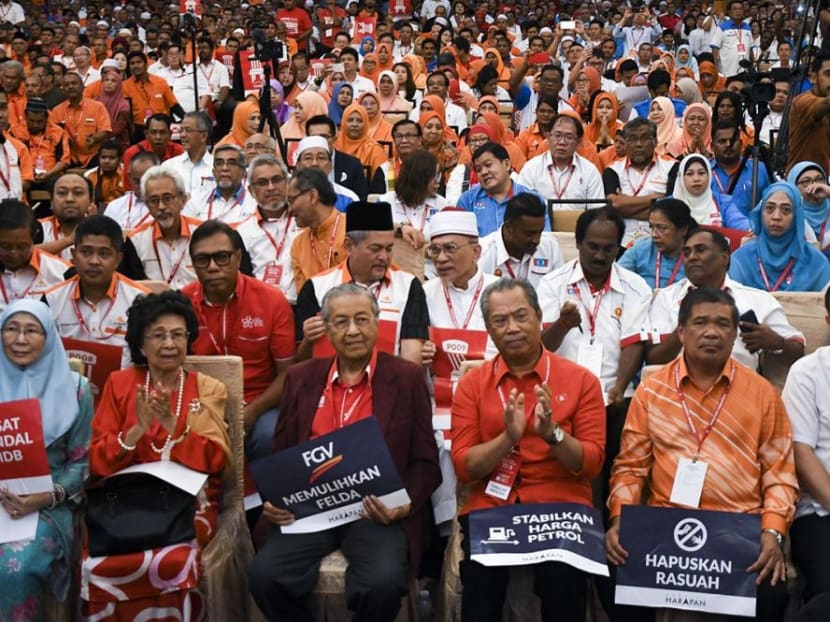Settling PM, DPM candidates and seat allocations a major breakthrough for ‘fractious’ Pakatan Harapan, say analysts
KUALA LUMPUR — Five years ago, Malaysian opposition parties were squabbling over seat allocations right up to the eve of the general election.
KUALA LUMPUR — Five years ago, Malaysian opposition parties were squabbling over seat allocations right up to the eve of the general election.
This time, Parti Keadilan Rakyat (PKR), Democratic Action Party (DAP), Parti Amanah Negara (Amanah) and Parti Pribumi Bersatu Malaysia (PPBM) have sorted out the thorny issue of seat distribution way ahead of the polls, which has to be called by August this year.
Quite an achievement for a coalition called “fractious” by political pundits and analysts.
They said it was a major breakthrough for the four Pakatan Harapan (PH) parties to agree to the seat distribution and candidates for prime minister and deputy prime minister.
And it showed how hard and determined they were to finalise matters ahead of PH’s second convention on Sunday (JAn 7), said Mr Wan Saiful Wan Jan, a senior visiting fellow at the ISEAS - Yusof Ishak Institute Institute.
“It is amazing that PH is able to reach an agreement on Prime Minister, Deputy Prime Minister, and seat allocations because the propaganda was that they were divided,” he said.
“Clearly, they are trying hard to prove that they are united. And the announcement showed that they can manage the diversity within their coalition.
Looking ahead, Mr Wan Saiful — who is also the founder of think tank IDEAS — said PH still faces many hurdles to navigate as it is vastly different from the ruling Barisan Nasional (BN) coalition.
“If we look objectively, there are significant differences between BN and PH in terms of how they are governed. BN is run by a dominant Umno while PH is run through negotiations between equal parties. Managing the differences of course will not be easy,” he said.
After several boisterous rounds of debate, former prime minister and now PH chairman Mahathir Mohamad was finally endorsed as the PH candidate for prime minister while PH president Dr Wan Azizah Wan Ismail was named as the candidate for deputy prime minister.
Along with the announcement of PM and DPM, coalition secretary Saifuddin Abdullah also confirmed the parliamentary seat allocations for Peninsular Malaysia.
Bersatu will contest in 52 seats while PKR will vie at 51 seats, with DAP (35) and Amanah (27).
Last week, independent pollster Merdeka Centre for Opinion Research predicted a win for BN and Prime Minister Najib Razak in GE14 because of three-cornered fights caused by opposition Parti Islam Se-Malaysia (PAS) and and PH’s fractious nature.
PAS split from the federal Pakatan Rakyat opposition pact in 2015 over differences of the former’s intention to implement the Islamic penal code in Kelantan. PH was formed after the dissolution of the old opposition coalition, Pakatan Rakyat.
Mr Hisommudin Bakar, the director for Malaysian think tank Ilham Centre, said it was a credible feat by the year-old PH that they manage to reach an understanding over seats allocation and the candidates for the country’s top posts so quickly.
“The opposition coalition has never reached an agreement over seats or PM. They have successfully overcome a huge hurdle,” he said.
But the political analyst warned that everything would go to nought if PH leaders cannot soothe their supporters who may be unhappy with the decisions.
“If they fail to appease their grassroot supporters, all the good work will be undone. And that will become a new challenge,” Hisommudin added.
The biggest task ahead for PH remains assuring the Malay voters, said International Islamic University lecturer Dr Maszlee Malik.
“PPBM’s real challenge is ensuring a Malay tsunami since they are PH’s best bet for that. Not only must it win the Malay hearts, but the biggest challenge is to convince the Malays that PAS is not relevant any more in the next elections,” said the political science lecturer.
Penang Institute researcher Dr Wong Chin Huat said Dr Mahathir’s influence gave the opposition a broader outlook and a sense of discipline.
“This coalition spans across a wide ideological spectrum, which holds vastly different positions on issues like NEP (New Economic Policy),” he said in reference to the blueprint which gives preference to Malays and other indigenous people privileged access to education, equity ownership and even the buying of houses.
“This could happen because the national crisis under Najib is much larger. And this builds the basis for the negotiation of a new social contract, replacing the post-1969 order.”
Dr Wong believes that when the dust settles, Malaysia may find better stability and healthier multi-party competition.
One of the seat negotiators, DAP’s Liew Chin Tong, said the seat allocation was historic as negotiations went on until the eve of nominations during the last elections.
“As such, there were some three-cornered fights in (state seats of) Kota Damansara and Semenyih in Selangor,” he said.
The benefit of deciding early will enable candidates, the election machinery and voters know what to expect ahead of the elections, he said.
“Take 2008, for instance. (Jailed opposition leader) Anwar Ibrahim and (DAP secretary-general) Lim Guan Eng had agreed to the seat allocations as early as January 9 (three months before 2008 elections) and that was an important factor for winning Penang.
“The wave set off by the certainty of seats and leadership was huge. We had certainty of leadership vis a vis a weak BN leadership in Penang,” said Mr Liew. THE MALAYSIAN INSIGHT










